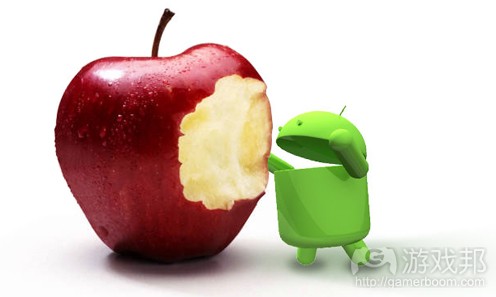Ilja Laurs预测2012年移动领域发展趋势
本文是独立应用商店GetJar创始人兼CEO Ilja Laurs对2012年移动领域发展趋势的看法。
1.苹果将在2012年败给Android
现在,iOS仍然是开发者们首选的目标平台,但是随着使用Android系统的智能手机和平板电脑越来越多,并以绝对的优势超越iPhone和iPad时,开发者将会转向Android,将其当成自己的首要并且是唯一选择。
2.Android将在2013年淘汰功能手机市场
Android智能手机的价格几乎每天都在下降,很快就有可能降至30-50美元,相信这种下跌幅度很快就能把功能手机挤出市场了。这同时也意味着诺基亚在新兴国家的低端设备市场主导地位即将结束,这也表明已经在智能手机市场节节败退的诺基亚将失去其最后一道防线。
3.谷歌将加强对Android的控制,并将在2013年封闭Android平台
虽然曾经定位为开放性平台,但是Android终有一天也会趋向封闭。可以说现在的Android平台已经不再具有多大开放性了。谷歌在控制其UI,服务以及应用发行的同时也极力约束着竞争商业模式和技术(如向开发商收成30%)。因为现在的Android人气高涨,经营一个封闭式平台定能够让谷歌赚取更多利益,相信谷歌也不会轻易放弃这种机会。
4.Android产品四分五裂的状态将影响其整个生态系统
Android平台一直存在分裂性问题。Honeycomb仅运行于平板电脑,再加上谷歌对Android施加的种种限制,许多公司都纷纷在Android平台的基础上换个包装推出自己的新产品。例如,亚马逊推出Kindle Fire平板电脑,以及最近盛传的Facebook手机。这种现象未来仍将持续涌现。
5.Windows Phone7获得支持
谷歌已经收购了Motorola Mobility,这个举动引起了众原始设备制造商(OEM)的恐慌。谷歌开始封闭Android平台之时,这种情况便开始对OEM造成威胁。为了谋得生存,这些OEM开始大力支持Windows Phone7的发展。而诺基亚也将大量生产Windows Phone 7手机。而一些运营商也将向竞争激烈的OEM领域加大投资,这意味着Windows手机还将获得更多支持。
6.运营商在语音和短信服务方面开始失利,将在2020年前出局
如Skype和Google Talk等免费服务将提供一般用户所需要的通讯服务,而运营商将只能够经营一些移动网络以及与用户无直接关系的服务。
7.运营商和OEM应用商店将失势并终将在2013年淡出市场
运营商和OEM缺少足够的技术,资源和规模以追赶那些与之竞争的服务,他们将先后失去大量开发者和用户。谷歌将加快马力继续排挤那些第三方应用发行渠道。
8.平台和OEM补贴手机硬件设备销售的现象到2015年将成为常态
随着Android影响力的上升,它将危及一度高利润的智能手机硬件市场。另一方面,应用程序和移动服务的不断发展也创造了更强大的移动经济,并延长销售过后的用户终身价值及收益。封闭式平台供应商通过垄断从最有利可图的领域中获取利益,并向其他开发商收取抽成。他们也将开始补贴手机设备的销售以帮助自身平台更好地抵抗其它平台的竞争。例如,亚马逊通过以低于生产成本的价格销售Kindle Fire,便是这种策略的典型。
9.NFC付费模式即将起飞,并在2015年前普及
随着NFC(游戏邦注:近距离无线通讯技术)在许多设备的普及,商家、用户将迅速接受这种技术服务。苹果和谷歌便是使用这一领域的先驱,还有一些运营商和初创企业也正跃跃欲试。
10.付费应用仍将持续式微
由于应用开始从内容转变成媒体,现在销售应用更像是在出售网站。虽然一些要价1、2美元的小型应用仍将幸存,但是大多数开发者将转向免费模式以及其它较复杂的运营模式。
11.应用数量将达到1千万并继续增长
以音乐领域为例,Gracenote(美国数字音乐软件供应商)的数据库中共有1亿多首歌曲。高产量的音乐产业每年能够产生250亿美元的收益。预计应用经济在今后三年也将创造出300万-500万美元的年收益,所以应用领域还有巨大的发展空间。
12.用户信息大规模转向云服务
用户只使用一台电脑的时代已经一去不复返了。随着越来越多电子设备的出现(包括手机,平板电脑,笔记本电脑,台式电脑,智能电视,智能汽车导航等),现在能够帮助我们更好地记录所有用户数据(照片,视频,电子邮件,文件,通讯录等)的方法便是云服务。对手机平台来说,留住用户的最佳手段之一就是提供强大的云服务以保存其个人数据。(本文为游戏邦/gamerboom.com编译,拒绝任何不保留版权的转载,如需转载请联系:游戏邦)
12 Predictions Regarding Mobile For 2012 And Beyond (Assuming The End Of The World Doesn’t Come)
GetJar found and CEO Ilja Laurs knows mobile. Having started GetJar in 2004 and then pivoting it into the world’s first app store, he has watched mobile titans rise (Apple) and fall (Blackberry). Every year he makes a list of his predictions for the coming year in the world of mobile. Here is his list of predictions for 2012. Agree? Disagree? Be sure to let us know in the comments.
Apple loses to Android 2012
iOS currently enjoys the #1 target platform for developers, but as Android smartphones and tablets start to heavily outnumber iPhones and iPads, developers will switch to Android as their first, and often only, choice.
Android explodes in the emerging markets, and destroys the feature phone market by 2013
The price of Android smartphones continues to drop almost daily, and soon prices in the $30-$50, range will all but kick feature phones out of the market. Most notably this will mean the end of Nokia’s domination in low end devices in emerging markets, their last bastion since losing the smartphone battle.
Google continues to restrict Android, and will close the platform by 2013
Once meant to be an open platform, Android will someday become closed. Already there isn’t much about Android that is open. Google controls the UI, services, and app distribution while restricting competing business models and technologies on top of imposing a 30% tax on developers. Now that Android has so much traction, the opportunity of running a closed platform is too lucrative for Google to ignore.
Android experiences a major fork that changes the entire ecosystem
Android has a forking problem. Honeycomb was only for tablets, and companies are putting skins on top of the Android OS left and right. Because of restrictions on Android imposed by Google, larger players will continue to fork Android to build their own silos. Amazon’s already doing that with the Kindle, and the rumored Facebook phone will do the same thing. As it becomes more of an issue, we’ll start to see more and more forks.
Windows Phone 7 gains traction
Google has already acquired Motorola Mobility, which is scary enough to OEMs. When Google starts to close Android, it will become a serious threat to OEMs. They will start hedging their bets to ensure their own survival, causing support for Windows Phone 7 to grow much stronger than before. On top of that, Nokia will finally start shipping large volumes of Windows Phone 7 phones. Carriers are also invested in more competition amongst OEMS, meaning even more support for Windows phones.
Carriers start lose ground on voice and text services, completely lose them by 2020
Over the long term, free services like Skype and Google Talk will provide all of the communication services needed by the average user. Carriers will only run data networks with little or no consumer facing services.
Carrier and OEM app stores lose traction and disappear by 2013
Carriers and OEMs lack the skill, resources and scale to truly reach a critical mass. Unable to come up with competing services, they will lose developers who will be followed by consumers. Google will accelerate the process by heavily discriminating against third party app distribution.
Platforms and OEM begin subsiding phones by 2015
As Android levels the market, it marginalizes once very high smartphone hardware profits. On the other end, the evolution of apps and mobile services allows for stronger economics and extends the lifetime income of each user past the point of sale, eventually shifting the margins from sale to post-sale. Closed platform providers are in a position to capture most of that value by creating monopolies for the most profitable segments and taxing the remaining ones. They will have a huge incentive to subsidize devices to accelerate platform adoption and attack competing platforms. Amazon is already running this strategy by selling the Kindle Fire for less than it costs to produce.
NFC payments will take off and become universal by 2015
As the penetration of NFC enabled devices reaches critical mass, merchants and users begin to adopt the technology really fast. Apple and Google are the frontrunners, but there are more than a few companies waiting in the wings, including Carriers and startups.
Paid apps continue to fade out
As apps become transition from content into media, selling apps makes as much sense as selling websites. A lot of small disposable, consumable apps that sell for a buck or two will continue to exist, but the majority of developers will continue to move into freemium and other complex business models.
The number of apps reaches 10 million and continues to grow
If you look at music, there are 100 million music tracks in the Gracenote database. The richness of the music industry is built on $25 billion in annual revenues. The app economy is expected to generate $30-50b annually in just the next 3 years, so there is quite a lot of room to grow for apps.
Mass migration to cloud
Gone are days when most users only used one PC. With the number of screens exponentially multiplying around us (phones, tablets, laptops, desktops, smart TVs, smart car navigations, etc.), the only way to keep up is by migrating all user data (photos, videos, emails, documents, address books, etc.) to the cloud. To mobile platforms, cloud services are a very powerful way to lock the user in by holding their data hostage.(source:getjar)









































 闽公网安备35020302001549号
闽公网安备35020302001549号